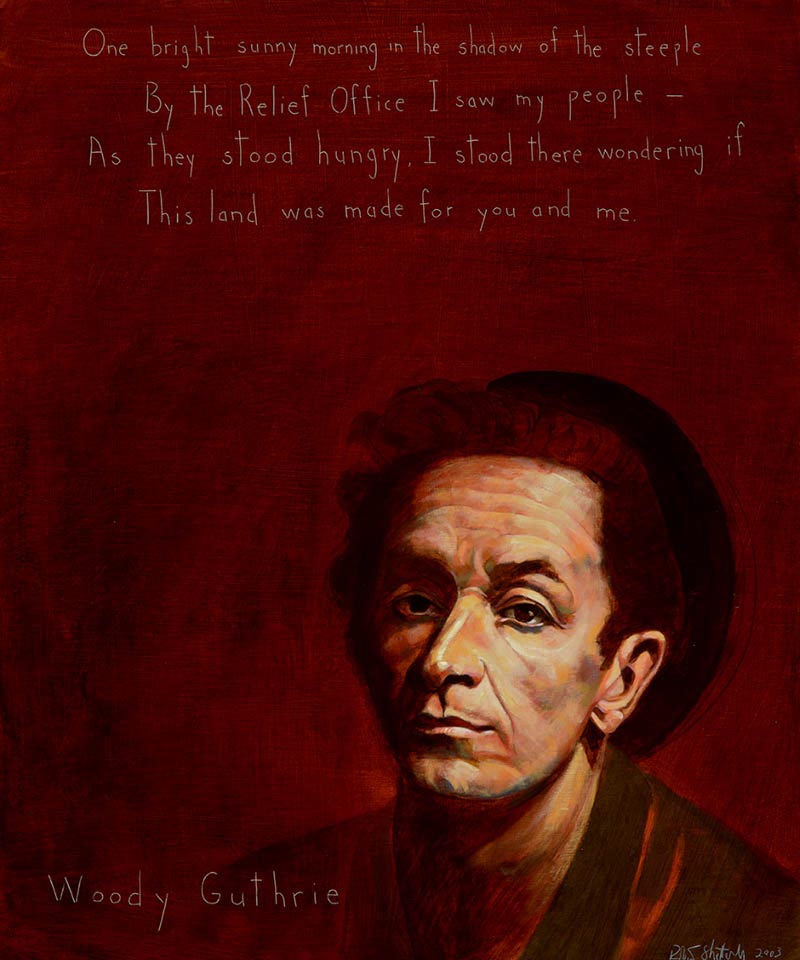
Woody Guthrie
Folksinger, Writer : 1912 - 1967
“One bright sunny morning in the shadow of the steeple / By the relief office I saw my people / As they stood hungry, I stood there wondering if / This land was made for you and me.”
Biography
Woodrow Wilson Guthrie wrote over a thousand songs, including such classics as So Long It’s Been Good to Know You, Deportee, and I Ain’t Got No Home. Songs of all kinds — about kids, cowboys, workers, and hobos — taken from real life. But the singer did not like all songs equally. Perhaps because he grew up in the Dust Bowl landscape of Central Oklahoma during a time of great depression for both his family and his country, Woody hated “a song that makes you think that you’re not any good.”
“I am out to fight those kind of songs,” he said, “to my very last breath of air and my last drop of blood.”
The song Woody liked least was Irving Berlin’s God Bless America, which he believed jingoistic and exclusive. His own song written in response originally was titled God Blessed America; today it’s known as This Land Is Your Land. “I’ve roamed and rambled and I’ve followed my footsteps,” the singer wrote. “To the sparkling sands of her diamond deserts. And all around me a voice was sounding [saying], ‘This land was made for you and me.’ ”
“All you can write is what you see,” Guthrie wrote at the bottom of the original manuscript to that song, and his many trips cross-country opened his eyes to a land where people went hungry, and the lives and health of immigrants and union workers were threatened by moneyed interests. When he sang about such things, some called him a populist; others, a Socialist or Communist. “Left wing, right wing, chicken wing — it’s the same thing to me,” Woody replied. “I sing my songs wherever I can sing ’em.” He also joked, “I ain’t a Communist necessarily, but I been in the red all my life.”
For the last 15 years of that life, while folk music became more and more popular in America, Guthrie was hospitalized with Huntington’s disease, the same genetic nerve disorder that had sent his mother into a state mental hospital when he was a boy. “Woody spent his life, like a lot of us, searching for things to love,” a friend once said, calling him “a little guy sloping down a dusty road, looking for something he couldn’t name.” Guthrie himself felt his best songs came to him when he was walking down a road. Seemingly afraid of money, or fame, and continually on the move, he left behind three wives, eight children (including the folksinger Arlo Guthrie, born in 1947), and a 1943 autobiography, Bound For Glory.
Woody Guthrie was “the original folk hero,” said the Rock and Roll Hall of Fame when he became one of its first 50 inductees in 1988 (same year as The Beatles).
The restless, drifting troubadour changed American music forever, the citation said, when he “transformed the folk ballad into a vehicle for social protest and observation,” and became an inspiration for many who followed including Bob Dylan and Bruce Springsteen.
Programs
Americans Who Tell the Truth (AWTT) offers a variety of ways to engage with its portraits and portrait subjects. Host an exhibit, use our free lesson plans and educational programs, or engage with a member of the AWTT team or portrait subjects.

Education
AWTT has educational materials and lesson plans that ask students to grapple with truth, justice, and freedom.

Exhibits & Community Engagement
AWTT encourages community engagement programs and exhibits accompanied by public events that stimulate dialogue around citizenship, education, and activism.